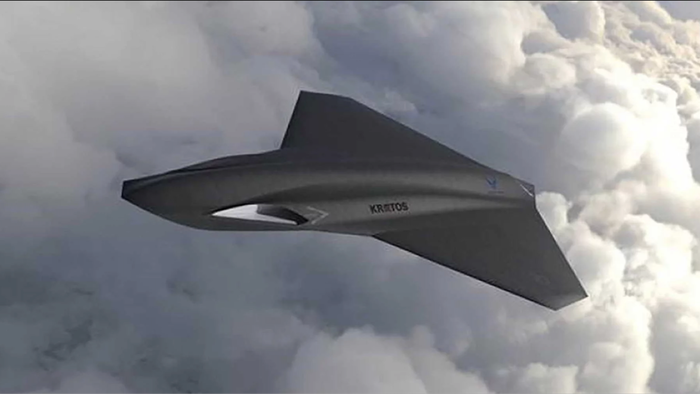Aviation Week has reported a significant milestone for Kratos Defense, as the company successfully tested its Thanatos stealth Uncrewed Combat Air Vehicle (UCAV) prototype in recent months. Steve Fendley, president of Kratos’ Unmanned Systems Division, confirmed these tests but refrained from sharing specific details regarding the test events or their locations. This development highlights the growing capabilities of the company in the realm of unmanned aerial systems, as they continue to advance their technological offerings in a competitive field.
The Thanatos UCAV was first unveiled in November 2023, with company CEO Eric Demarco expressing aspirations for a contract within a year. The design features a single-engine setup, complemented by two air inlets and a single exhaust, which are indicative of its stealth capabilities. Notably, the aircraft deviates from traditional designs by excluding both a vertical tail and horizontal stabilizers, showcasing a unique approach aimed at enhancing stealth performance. This design choice aligns with current trends in military aircraft that prioritize reduced radar cross-section and improved maneuverability.
During a recent interview at the Reagan National Defense Forum, Fendley spoke candidly about the progress of the Thanatos program. He indicated that the air vehicle has been effectively proven, shifting the focus from whether the aircraft can fly to assessing whether the integrated system meets mission requirements. This suggests a mature phase of development where operational capabilities and mission effectiveness are being rigorously tested to ensure that Thanatos can fulfill its intended roles in various combat scenarios.
Kratos is actively pursuing a contract for the Thanatos UCAV with an undisclosed customer, which analysts speculate could be the United States Air Force (USAF). The USAF’s interest in innovative solutions for its Collaborative Combat Aircraft program positions Kratos’s offerings as potentially fitting. The program seeks to develop and deploy drone systems that can operate collaboratively with manned aircraft, increasing the effectiveness and survivability of U.S. military forces in complex operational environments.
The backdrop of growing public interest in unmanned aerial vehicles is further colored by the ongoing discourse surrounding mysterious drone sightings in New Jersey and New York, often referred to as ‘dronegate.’ This situation has sparked conversations about the potential nature of unidentified flying objects reported by military pilots, with opinions suggesting that they may actually be advanced stealth drones rather than extraterrestrial phenomena. Kratos’s latest test flights may support this theory, as they indicate the existence of sophisticated technologies capable of agile flight and stealth operations.
In summary, Kratos Defense’s advancement in the Thanatos stealth UCAV program signifies a notable step in the evolving landscape of unmanned military aircraft. With successful test flights and a focus on fulfilling specific mission needs, the company appears well-positioned to attract interest from military clients like the USAF. As the battlefield increasingly incorporates unmanned systems, Kratos’s innovative designs may contribute to redefining air combat dynamics, linking contemporary military strategy with cutting-edge technology while capturing public fascination surrounding advanced aerial phenomena.

